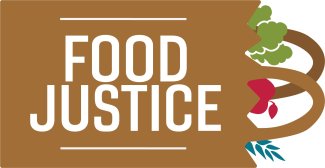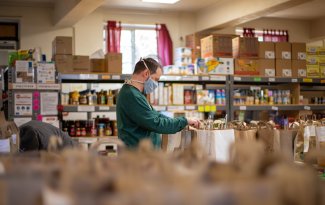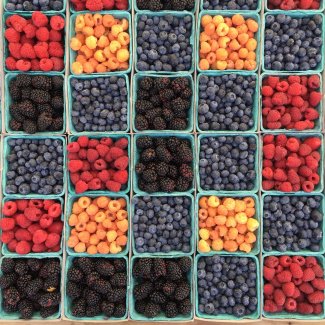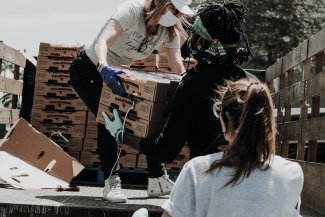
The Grand Challenge Theme for Year 1 is Food Justice. Participants of The Justice Challenge in the 2023-2024 academic year will explore the complexities of Food Justice from food production and safety to distribution, access, culture, affordability and more.
Opening Workshop
The one-day event began with a common, all-online experience that provided opportunities for the Scholars community to meet and exposed students to the Food Justice Grand Challenge through hearing from leaders in the field.
Grand Challenges Colloquium
More than 100 students from 21 higher education institutions met online once per week with dual foci of meeting with a subject expert or experts and applying the knowledge in an online workshop format. Topics included: context of food justice; health equity curriculum; indigenous food sovereignty in the western United States; food cultures and food geographies; sources and impacts of inequities; food deserts; barriers to achieving food justice; and campus food insecurity. For many students, the highlight of the experience was participation in an engaging Reacting to the Past simulation roleplay to commence our mutual learning each week.
Signature Experiences
Signature Experiences are offered in multiple formats to allow each participant flexibility in what best accommodates their needs. Signature experiences include the Design Challenge, Hackathons, and Field Course described below. Students will be matched to one or more of these experiences based upon their preferences and availability.
Spring 2024 Dates
- Online date/time January 19-20, 2024
- Online date/time February 16-17, 2024

34 Justice Challenge Scholars from 13 different institutions participated in the inaugural Hackathon experience.
Hackathons have quickly gained acclaim for promoting and accelerating innovation well beyond their origins in the information technology community (Falk Olesen & Halskov, 2020). During a typical hackathon, enthusiastic problem solvers gather, form working teams, and develop innovative solutions for the given challenge, concluding the event with solutions presented and evaluated based on workability, feasibility, and usability (Brenner, 2011). They are fun and informal, an excellent learning platform that attracts a diverse spectrum of students, especially those interested in branching out from traditional classroom settings and with a hunger for experiential, project-based learning (Nandi & Mandernach, 2016). Hackathons are known to expand student participation in STEM and FANH sciences by advancing educational opportunities, particularly for underrepresented groups (Parker & Wagner, 2016), while developing competencies with transdisciplinary collaboration.
Over the course of two days, student problem solvers from multiple institutions form working teams and develop innovative solutions for an issue central to food justice.
Spring 2024 on-site at:
- Virginia Tech, Blacksburg, VA
- University of Louisville, Louisville, KY
- South Dakota State University, Brookings, SD

The semester-long Design Challenge is a local, in person opportunity for students to identify and propose solutions to a local problem related to the Grand Challenges Annual Theme. This is delivered as a seminar with students from multiple majors participating. A pedagogy built upon design thinking encourages creativity, critical thinking, and collaboration on solution design in an iterative process with great potential to transform higher education (Björklund et al., 2019). A key concept in design theory is understanding the inter-relationships and complexities of what are termed “wicked problems;” i.e., so inter-related are these that a singular solution may lead to further problems unless they are tackled at a systemic, structural level. Design theory is firmly grounded in developing solutions by working closely with the community. As such, the Design Challenge provides participants with a lesson in participatory democracy.
Student problem solvers from a single institution spend an in-person semester (equivalent to a 3-credit course) to develop innovative solutions to a local challenge central to food justice.
May 16-23, 2024 Oklahoma State University, Stillwater, Oklahoma

This seven-day in person experience immerses students into a deeper exploration of the annual theme within a given community. The Field Course provides student participants with experiential learning opportunities through the application of the widely used “place as text” model to explore the annual theme. Thus, students experience real-world constraints, opportunities, and realities of the topic from the blended scientific expertise of the Field Course coordinators and the lived expertise of local communities. The curriculum is packed with local community visits, team building, problem solving, and culminating projects.
A seven-day in-person experience immerses students in a deep exploration of food justice within Stillwater, Oklahoma and surrounding communities.
N.B. Each student participant will receive a flight subsidy of up to $500. Room and Board will be provided. Student participants will be housed on-campus and provided with a campus meal plan.
Students will experience real-world constraints, opportunities, and realities of food justice from the expertise of field course coordinators and the lived expertise of local communities. The curriculum will be packed with local community visits, team building, problem solving, and culminating projects.
June 6, 2024, 6-9 p.m. (EST)
The annual program ends in a Culminating Conference for students to reflect and to provide a forum for cooperative learning among students from their Signature Experiences. Student participants create an asynchronous artifact that becomes available to peers, experts, and the Assessment Committee on an e-portfolio system. Students form panels for interactive Q&A sessions with their peers, faculty, and guest experts to detail the extent of their learning with one another in real time.
Participants gather in an online format to showcase their portfolios and program outcomes.

